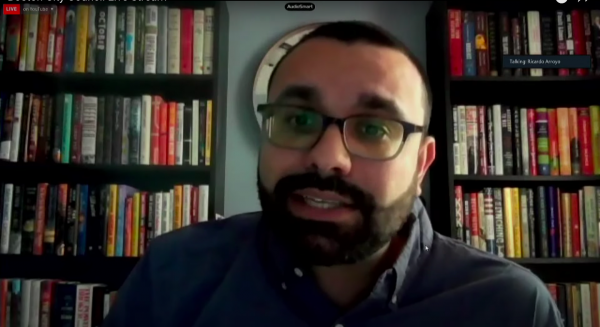January 13, 2021

District 5 Councillor Ricardo Arroyo introduced the petition to his colleagues on the council.
City Council conundrum: election scheduling
The Boston City Council last Wednesday debated the merits of a Home Rule Petition that, if approved through four stages of signoffs, would set aside a special election that, according to the city charter, would be triggered if Mayor Walsh vacates his seat before March 5.
The petition, introduced by Councillor Ricardo Arroyo a week earlier, must be approved by a majority of the council and Walsh before it is sent to the Legislature and the governor for their approvals.
After the debate, the petition was sent for further study by a committee chaired by Councillor Lydia Edwards. A spokesperson for Edwards told the Reporter on Tuesday that the hearing would be scheduled "in the next few weeks."
During the virtual Council meeting on Jan. 13, Arroyo argued that voters should wait for the already scheduled September and November municipal elections to choose Walsh’s successor.
“I want to make clear that everything this petition calls for would happen automatically if Mayor Walsh resigns on March 5,” Arroyo argued. “This has been an extraordinary year and we are continuing to see Covid positivity numbers increase and an alarming number of hospitalizations.
He added: “There is a very real possibility of three mayoral transitions this year, and four different mayors at the helm in eleven months. Under these conditions, when we can act to prevent it, we should. Spending precious funds for multiple elections for the same office in the same year is not fiscally responsible.”
Council President Kim Janey, who will become acting mayor when Walsh resigns, supports Arroyo’s petition because, she said, “special elections historically disenfranchised communities of color and low-income communities.”
Councillors Michelle Wu and Andrea Campbell, who are actively running for mayor, have come out in favor of Arroyo’s petition as well. But not all of their colleagues agree with them.
District 6 Councillor Matt O’Malley, who announced in December that he will not seek re-election this year, noted that the March 5 “line of demarcation” in the city charter is “not an arbitrary date. There is some thought behind it.”
He said, “The decision of whether or not to have a special election this far out is meant in the spirit of fairness for an open race. The other side of that is that there are certain powers vested in an elected mayor that do not transfer to an acting mayor and having an acting mayor for a longer period of time could potentially result in complications.”
O’Malley added that the petition “would benefit some, and in a time where there is such cynicism around those seeking elected office. I would hate to see that we’re putting the thumb on the scale for anyone.”
District 8 Councillor Kenzie Bok, who is not running for mayor, argued that there are “obvious political implications for folks who are maybe considering a run for mayor” at play in considering Arroyo’s petition.
“Even when something is inconvenient, you shouldn’t change the rules in the middle of the process,” she said. “If you’re in a position where you have more of an organization and money pulled together, you're likely to benefit in a special election. If you’re someone thinking about running for mayor or if your acting mayor, you’d be advantaged by canceling the special election.”
Dorchester’s Frank Baker, the councillor for District 3, said he did not “have a dog in this race,” but argued against overriding the charter.
“The rules should stay the same,” he said. “Let’s play by the rules. Just because we have the ability to change the rules in an election doesn’t mean we should necessarily do it.”
Baker also took issue with how passing the petition would “hand the city over to someone that has not been duly elected for 10 months. I think that that is a problem,” he said.
Councillor Julia Mejia, an at-large member from Dorchester, said she “wholeheartedly supports” Arroyo’s petition. “Oftentimes there are some people that benefit more from the current construction,” she said. “This is about making sure that we create a pathway for all folks to make sure they have a successful run.”
Edwards plays a key role in what happens next, since the petition is now before the council’s Government Operations committee, which she chairs.
This week, Edwards’s office told the Reporter that she plans to hold a hearing on the matter “in the next few weeks,” which would likely be at the end of January or early February.
“We are about to have a historic conversation that weighs whether our charter is meeting the practical realities of a pandemic and what is the most democratic way to ensure voters are fully enfranchised,” Edwards said in a statement to the Reporter.
“There are a lot of opinions on the table, including edits to the original proposal. I’m looking forward to the dialogue.”
Maddie Kilgannon, a Reporter correspondent, contributed to this article.


